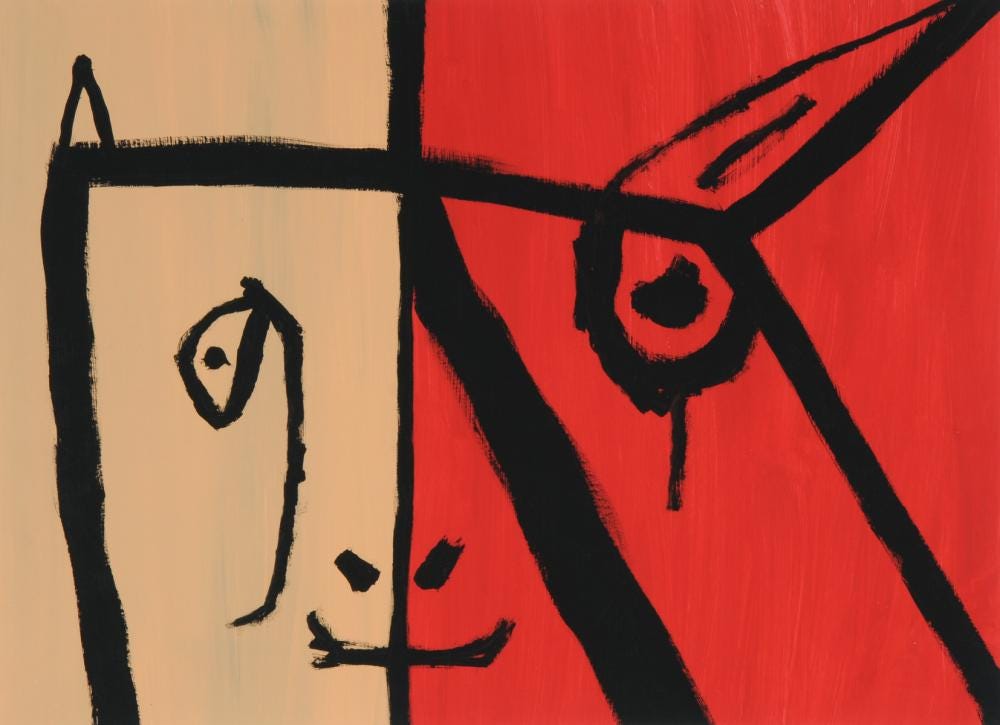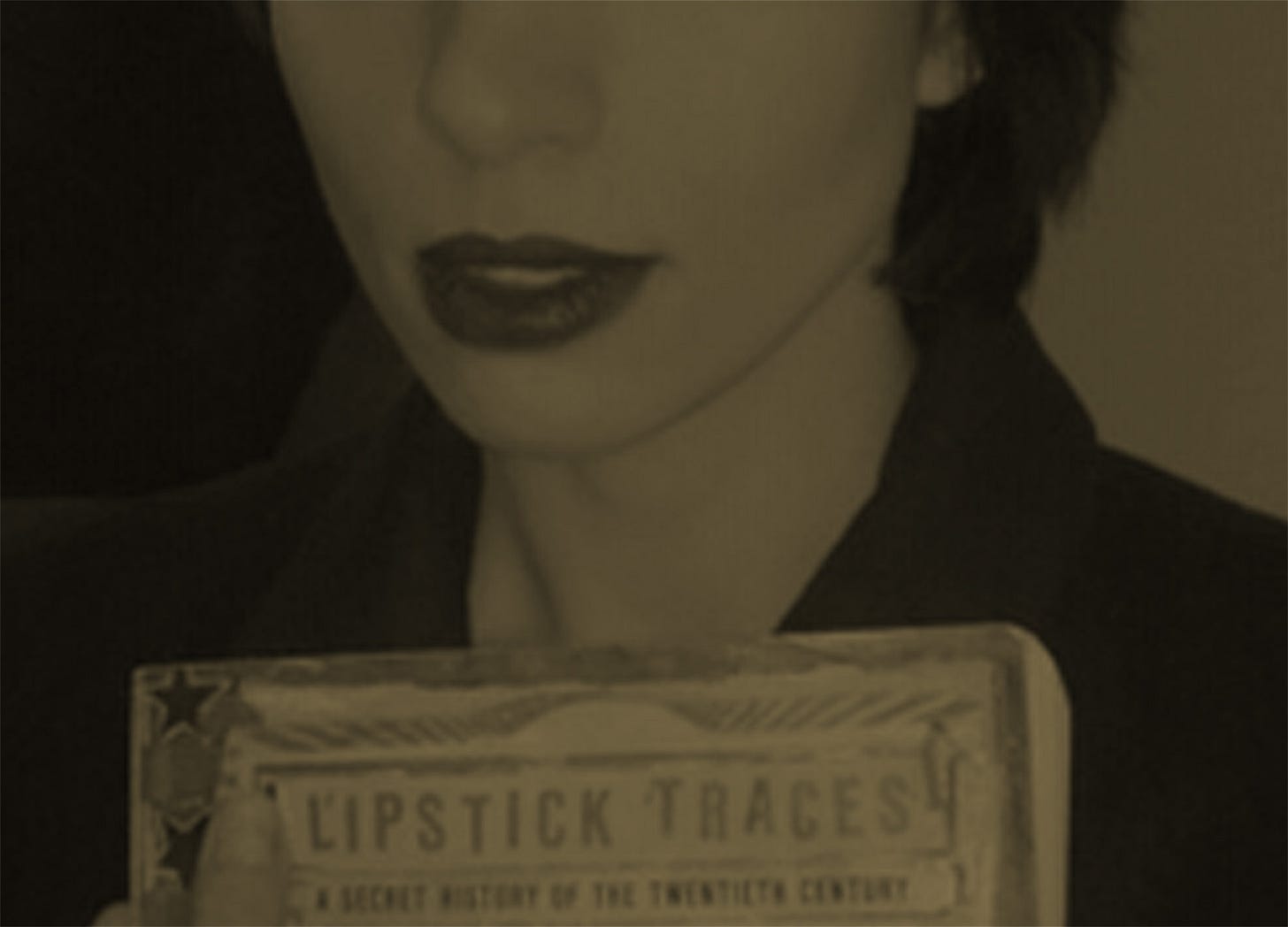The 'Days Between Stations' columns, Interview magazine 1992-2008: Liliput
August 1993
Swiss punks are dope
To a lot of people, “punk," whatever it was, upped and died in the U.K. between 1976 and 1978. I still remember an intricately gruesome comic strip on the great event: "The 36-month punkreich had kollapsed inna fiery ruin"—graphics showed a pile of twisted bodies, one with a syringe sticking out of its chest—"and it looked like not a living thing would krawl from the wreck-age." (Though from beneath the postapocalyptic rubble emerged a skinheaded "Rudy"—heroic leader of the now forgotten 2-Tone ska revival.)
Outside of England, where punk purity made no sense, the Death of Punk was meaningless, a tree falling in someone else's forest. Punk—as the public attempt to discover one's own voice, let's say, a likely embarrassment protected by anonymous noise—was just getting started. "The original scene was made of people who were taking chances and operating on obscure fragments of information," said Slash editor Steve Samiof on the Los Angeles punk scene—but his words cover every other scene outside of London's. That's where Liliput started—from zero.
Zero in this case was Zurich, in 1978. In the beginning there wasn't even a name, just bassist Klaudia Schiff (otherwise a painter, under her full name, Schifferle), drummer Lislot Ha, and two men. They had four songs for their first gig. The two men slunk off in shame and disgust. In the audience was Marlene Marder (a clerk and mail carrier, as well as a saxophonist for another band); she immediately stepped up to play guitar.
They were all in their early or mid-twenties. They found a lead singer, Regula Sing, and called themselves Kleenex, a perfect pop-group name, at least until Kimberly-Clark's trademark cops forced the switch to Liliput (or, as the band always tried to insist, LiLiPUT). With Schiff and Marder as core members, the band changed vocalists three times, lost their drummer, let a man or two pass through, and so on—and yet the true sound of the ensemble never really altered. As can finally be heard on LiLiPUT (Off Course), a 139-minute double CD that covers five singles, two albums, and fourteen fugitive or unreleased recordings, the sound was unique at the beginning and it was unique at the end.
Regula Sing had a thick, deep, Germanic voice, not built for speed; teenager Chrigle Freund, at the front mike in 1980-81, was lighter, quicker, more personable; Astrid Spirit, 1981-83 (vocals plus cake pan, violin, birdcalls, finger cymbals), moved faster than anyone else, seemingly propelled by a will to avenge unmentioned crimes. Still, it was the stuff that came out of the background that defined the music.
As far as anyone had ever heard before, this stuff was absolutely female—noises males would have been ashamed to make then and would likely be ashamed to make now: "EEE EEE!," "OO!," a pulverizing "WOO, WOO, WOO, WOO!" the syllables racing in a circle like a boomerang. Even with high, gleeful background singing on actual words, the women took basic bits of sound, varied them with tones of voice, tempo, rhythm, and, before their first release ("Beri-Beri," "Ain't you," "Hedi's head," "Nice") was over, had a whole new language. It was the language of people so full of resentment and desire, playfulness and fear, that they simply cannot keep quiet—people discovering there was no reason they should. By 1980, with the single "Split"—punk as unpredictable and undeniable as any made from 1976 to now—noises translated into words, words into noises. There was no way to tell the difference, no purpose in trying.
Save for occasional head-down, into-the-wind battles like "Madness" (1978) or "Eisiger Wind" (1981), Liliput's rhythms and melodies were jerky, stop-start, moving platforms for voices—floating launching pads. Riffs and themes seemed pasted together, or found: ready-mades cut up and distorted. Certainly, that is how the lyrics evolved. Aside from the odd number in French, the band's own Swiss-German, or un-languages, the songs were in English—which Schiff and Spirit, the principal writers, barely knew. They wrote in English, Marder once explained, not to reach markets in the U.S. or the U.K., or even to communicate across their trilingual homeland; to them, German or Swiss-German was simply too precise, too definite, with a word for every phenomenon. There was no room in it for play. But English was a field of chance, happenstance—as Liliput picked out words for their sounds and then tried to string them together with a semblance of logic, meanings would be lost and meanings would emerge out of the mess. Spirit wrote from the dictionary, scanning for words or phrases that stopped her eye even if she didn't know—or never found out—what they meant.
Songs were found even within songs. In "Hedi's Head" the singers—no leader, here—are nearly beside themselves with sarcasm and laughter. “Hedi’s head is so dread/ Hedi is oh so sad," they chant. The feeling of people breaking loose is irresistible: they sound like ten-year-olds maniacally cutting up their Barbie dolls. But both the song's title and its lyrics came from the chords out of which the band constructed the basic tune, in German notation: H/E/Dis H/E/A/D.

Out of all this they made a music where anything could happen. Schiff could play her bass with a tom-tom mallet; the "Beep beep!” of the rape-alert whistle that makes up the key rhythm of "Hitch-hike"—"I'm afraid," runs the chorus—is gay and sweet. In "Krimi," the singer is sitting on her TV set; a killer crawls out of the screen (because she's hatched him?), and they play hide-and-seek.
Some of the music on LiLiPUT was made during the years when youth riots shook Zurich. The riots were cultural: one began as a protest against the city taking money from youth services to refurbish the opera house. As Klaudia Schifferle, Liliput's bassist received large grants to support her painting; when Marder put in for a grant for the band itself, she was ruled out of court—Liliput was "commercial," not "fine," art. But Schifferle's painting is of a piece with the music. Her figures are like dolls come to life, then decomposing—big, clumsy, simple things with huge smiles and round eyes. They're first of all benign—bright colors, easy lines, suitable for children. It takes awhile to see the violence taking place within the pictures, and it can be fearsome: nightmare torture and murder. But you don't have to notice that if you don't want to.
Originally published in Interview Magazine, August 1993
My friend Marlene Marder died in 2016 at 61.



I guess there can't be punk rock one-hit-wonders if there never were really any punk rock hits. But if there could be a punk rock one-hit-wonder one of my absolute favorites would be Kleenex's "Ain't You" on the Wanna Buy a Bridge? comp from 1980.
Im sure you see this Grail! just stumbled over it it's a tribute punky style to you and the Dean, if hes Dean, Yr Holy here was a time back then {Images of America
When all this came to an end Images of America
https://www.youtube.com/watch?v=v9ue0tQqFLc
But now has started again Images of America
And he's becoming a friend Old, weird America x4}
O yeah 'bout Street Legal , Desire and the others you're out on , yr just being subjective spoiled so yr Own fans, know
It's just you, not me,
Just you, not us
Yr wrong about Chomsky too
About Assange, & G Greenwald
Yr outright off about Post Imagine Lennon,
Yr way wrong about the Soft Parade and Van the Man don't like you at all
Time to take a course in the Humble Down ego again
That aside yr pretty good
for someone's who not a creator,
O and yr wrong in Lipstick Traces about R, you didnt read enough, like ANtiOedipus and others , since
stuck in the Old weird AMerIca
O and yr way way way off about Elvis, what would you know about Elvis,
and you were wrong about me
Mister Rolling Stone was not the One
he was a part of that greater thing and he'd never say such nonsense unless he was on drugs
you put Dylan so
high
you shame
him
An yr new book does no justice to Desolation Row and other tun e